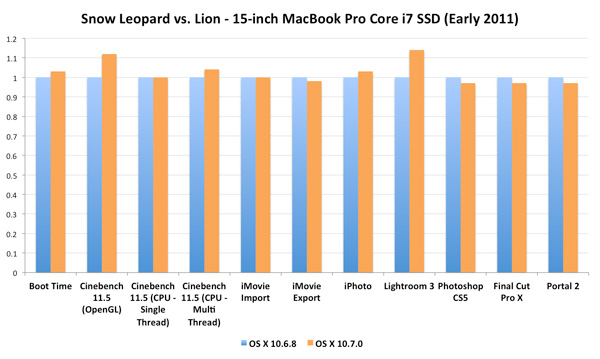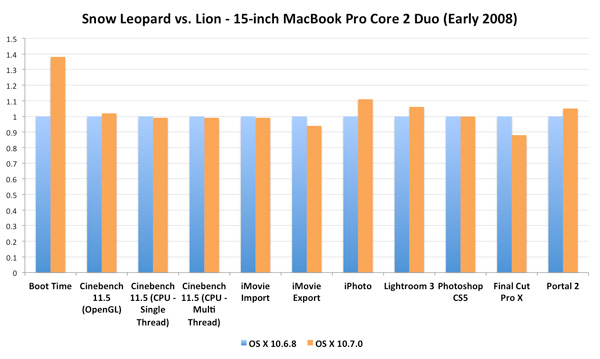Back to the Mac: OS X 10.7 Lion Review
by Andrew Cunningham, Kristian Vättö & Anand Lal Shimpi on July 20, 2011 8:30 AM ESTPerformance: Similar to Snow Leopard
Benchmarking Macs is a lot like benchmarking smartphones: there's a huge user experience component and not enough tools to really do a thorough job of evaluating performance. The majority of our OS X benchmarks involve patience and a stop watch and we've redone the whole suite in anticipation of Lion.
Generally speaking, performance under Lion hasn't changed all that much since Snow Leopard. Earlier beta releases of the OS were significantly slower than Snow Leopard, but the final code appears to perform on par with SL regardless of microprocessor architecture.
We tested Lion on two platforms. A brand new Core i7 15-inch MacBook Pro and a much older Penryn Core 2 Duo 15-inch MacBook Pro. We measured performance across a number of applications as well as battery life.
The graph below shows the 2011 MacBook Pro and how its performance fares under both OS X 10.6.8 and 10.7.0. As you can see for the most part performance really remains unchanged:
There were a couple of tests that showed more than a 10% increase in performance (possibly a reflection of Lion's upgrade to OpenGL 3.2 from 10.6's not-quite-3.0) but generally Lion performs no differently than Snow Leopard regardless of the nature of the benchmark. GPU performance also remained mostly unchanged as you can see by the Portal 2 numbers, although the Cinebench 11.5 OpenGL test did go up a bit.
The situation isn't really any different on the older Core 2 Duo MacBook Pro either:
Boot time skyrocketed for some reason (perhaps an artifact of the Lion upgrade on a system with a standard HDD instead of an SSD) but otherwise performance remained mostly unchanged.
Only our iPhoto test showed a greater than 10% increase in performance. Everything else either dropped slightly, stayed the same or showed a small increase in performance.
The seat of the pants feel while using Lion echoes our performance results. While some UI animations seem sped up, most tasks don't feel any quicker under OS X 10.7. Some of the new features under Lion do feel like they require a good amount of processing power. Take the new threaded view in Mail for example. My personal machine is a 2011 MacBook Pro with a 2.3GHz Core i7 and an SSD. Once you get over a dozen replies in a thread just loading the thread easily eats up 50% of one of my Core i7 cores.
What about longer threads? Take a look at what happened when I viewed an email thread with 65 replies in my Inbox:

Three cores at 100% just to load the thread. Note that the loading process took a few seconds, dropping down to only 100% CPU utilization before finally completing the load.












106 Comments
View All Comments
quiksilvr - Wednesday, July 20, 2011 - link
$29 is indeed a solid improvement. However, given the Mac Store now being out there, their desktop OS should follow the formula of their mobile OS: Free to upgrade. These features are nice but I can't help shake the feeling that these are Service Packs (because they are). And with their "app" store available on the OS and the means of most of their cash inflow, it makes more sense to make this a free upgrade for everyone instead of a $29 upgrade.xype - Wednesday, July 20, 2011 - link
Service packs? Are you serious? Read up on the changes and try to come up with one service pack that changed as much.Some people…
danielkza - Wednesday, July 20, 2011 - link
XP SP3 would be a good candidate, but yes, 10.7 is a bit beyond what one could reasonably call a Service Pack.Taft12 - Wednesday, July 20, 2011 - link
You're thinking of XP SP2, and if you have to go back 7 years to come up with a comparable "service pack", it's certainly fair to say OSX 10.7 is more than a service pack.AfroPhysics - Friday, July 22, 2011 - link
I fail to see how the age of the service pack matters. Xype asked for an example and qualified nothing.ltcommanderdata - Wednesday, July 20, 2011 - link
Are we really going through the tired argument that every 10.x update to OS X is just a service pack and should be free? Then at what point should Apple try to recoup costs for OS development, because even if individual point updates are evolutionary, going from the original 10.0 to 10.7 has got to be a major change in anyones eyes. And the same questions could be raised about Windows NT 6.1 aka Windows 7 where the server version is bluntly labeled Windows 2008 R2 and Windows NT 6.0 aka Vista/2008 or Windows NT 5.1 aka XP and Windows NT 5.0 aka 2000.Besides, even if you discount the user facing changes, Lion has seem some major security infrastructure changes. Both the 32-bit and 64-bit kernel have been rewritten with full NX-bit and ALSR support as in place in Windows Vista/7 addressing the major security complaint Charlie Miller had with OS X. Application sandboxing frameworks are now available and soon to be mandatory for Lion apps in the Mac App Store which I believe is a security feature that even Windows isn't pushing yet. With the dropping of the Core Duo, the Lion has also be rewritten to make more use of SSSE3 instead of just SSE3 as pointed out by the Hackintosh community. Lion isn't just Snow Leopard with a few features added on top, but the entire OS has seem updates at a low level even if the user might not necessary see all the differences.
ltcommanderdata - Wednesday, July 20, 2011 - link
And about the App Store being a major source of income for Apple, Apple has consistently said they aim to run their stores as a break even venture.http://www.macrumors.com/2011/07/19/apple-reports-...
I'm not clear if the iTunes Store in the graphic in the above link includes the App Store, but at the very least as an example of Apple's digital store, the revenue stream really hasn't increased in the last 2 years. Apple's sales growth is clearly from their hardware, iPhone, iPad, and even Mac.
GotThumbs - Wednesday, July 20, 2011 - link
$1,634,000,000 in revenue from Other Music Related Products and Services (3)(3) Includes sales from the iTunes Store, App Store, and iBookstore in addition to sales of iPod services and Apple-branded and third-party iPod accessories
I'd say their goal of a break even venture is not an accurate description of their stores. Hence the creation of the MAC Store. It sounds like a nice thought, but Apple is in business to make money and it seems their VERY good at it. Perhaps their projection analysis was a bit off.
Hey, this is good news for the investors and I understand that they are a business. Lets not be too naive and just don't drink the cool-aid.
ltcommanderdata - Wednesday, July 20, 2011 - link
Perhaps my finance terms are wrong, but I'd hope the Apps Store is taking in revenue. But if Apple should be offering some of their other products like OS X updates for free, shouldn't we be concerned with whether the App Store is making major profits, such that there is money to spare to pay for OS development?solipsism - Wednesday, July 20, 2011 - link
Revenue ≠ ProfitThey've paid billions to both developers, and music and video cotent owners. They've also spent money on the infrastructure to support their stores. I'm sure they're making a profit as all good for-profit companies should, but it's not the cash cow you've attempted to present here.